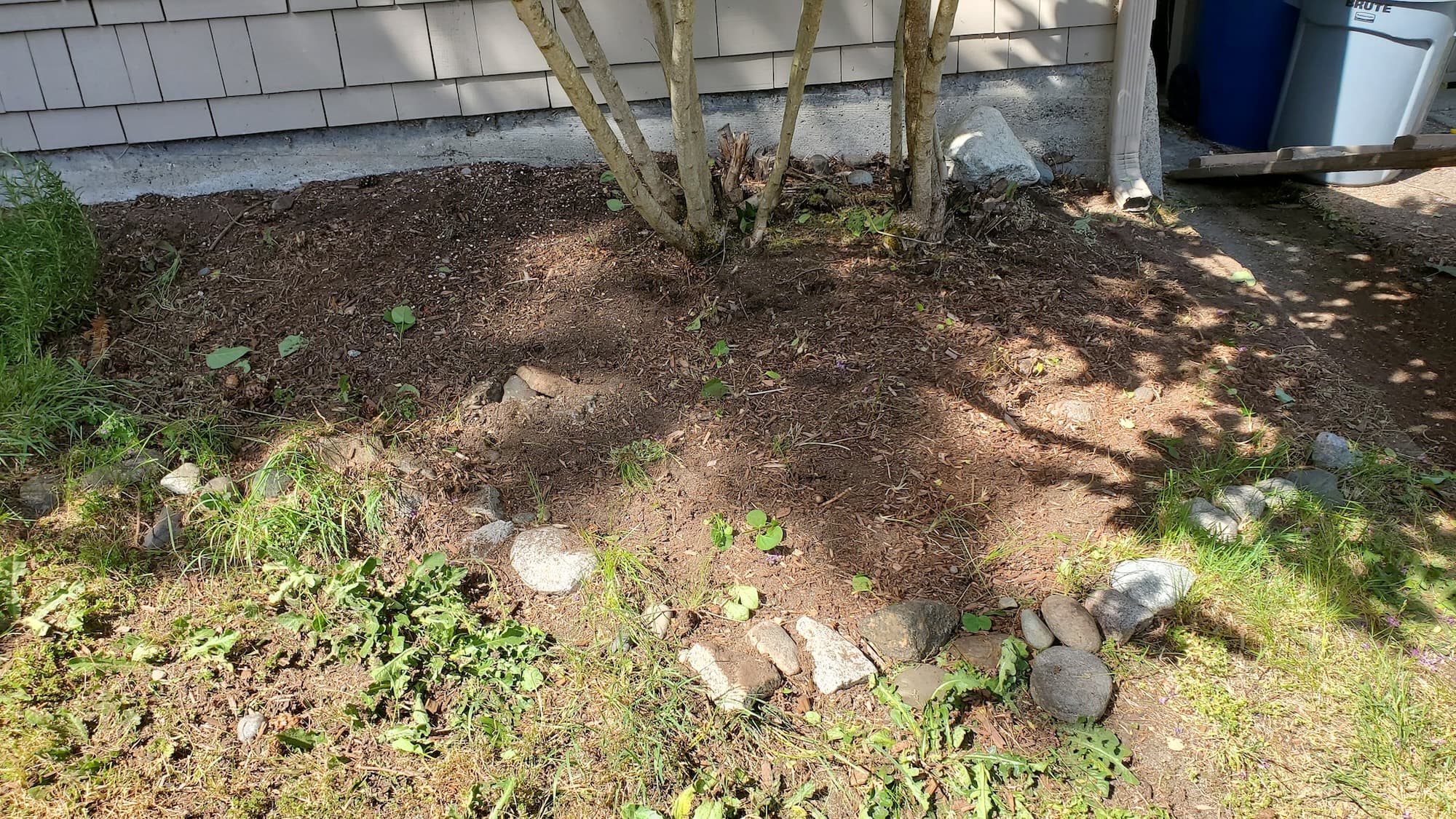West Seattle Remove unwanted plants
Homeowner’s Issue
West Seattle yards show a distinctive set of problems: soggy low spots after heavy rains, moss in shady north-facing corners, and aggressive ivy or English holly climbing fences and trees. Much of the soil here is shallow glacial till over compacted clay, with pockets of richer loam in older garden beds. That means plants that like a quick, well-drained summer (drought-tolerant natives and ornamental grasses) struggle in heavy winter rains, while shade-loving moss and ferns thrive under the big conifers and maples.
Exposure varies block-to-block — ridgelines around Admiral and the sunnier slopes near Alki can bake in summer sun, while properties near Lincoln Park keep damp and shaded. Slopes and terraces are common, so root-bound invasives can destabilize a bank and mess with drainage lines. HOA rules and curb-appeal standards in many West Seattle pockets also push residents to keep sight-lines clear for safety and parking. Add in relentless spring weed flushes and the occasional blackberry thicket in ravine edges, and you’ve got a mix of maintenance headaches that require repeated, thoughtful work rather than one-off chemical fixes. We remove plants by hand, by mechanical root extraction, and with smothering/sheet-mulch techniques — never herbicides — to protect soil life, storm drains, and neighbors’ gardens.
Our Quality Service
We focus on sustainable, practical plant removal tailored to West Seattle microclimates. Typical workflow: site assessment, targeted removal (hand-pull, grub roots, stump grind for larger shrubs), remediation (amend soil, regrade minor drain issues), and tidy haul-away or green‑bin disposal. We use pruners, loppers, grub hoes, a small stump grinder if needed, and fabric/compost for sheet mulching.
Realistic timelines: small beds or a single overgrown shrub — same-day or half-day. Yard-scale jobs or steep slope removals — one to three days depending on access and disposal. Seasonal note: best deep work done late summer to early fall when soils are drier; spring is great for light cleanups. We avoid herbicides entirely and prefer organic methods and native replacements where appropriate. Benefits: safer slopes, improved curb appeal, reduced re-sprout risk, and lower long‑term maintenance.
What’s Included
- Full site assessment and plant ID
- Manual removal of weeds, ivy, invasive shrubs, and roots
- Stump grinding for removed shrubs/trees (if requested)
- Clean-up: sweeping, edging, haul-away or green bin sorting
- Basic regrading to improve surface drainage around beds
Options / Upgrades
- Mulch + landscape fabric or sheet-mulch with compost
- Organic weed-control follow-up (hand-weeding cycles)
- Native plant replacement or low-water groundcovers
- Gravel path prep or turf removal for new beds
- Haul-away vs. green bin sorting for resident composting
Before & After / Expectations
Work will be noisy and dirty for a day or more on medium jobs. Expect chainsaw/stump-grinder noise if stumps are removed. Access matters: narrow side yards or steep stairs can add time and cost. We’ll flag utilities, protect fences, and cover walkways where we work. Debris: you choose haul-away or green‑bin sorting; heavy loads may incur dump fees discussed upfront.
Post-service care tips for West Seattle:
- Water new plantings in early morning during dry spells; late spring and early fall are ideal planting windows.
- Watch for spring and fall weed flushes; schedule light follow-ups in those seasons.
- For shady, moss-prone spots, improve drainage and thin tree canopy where HOA rules allow.
- Remove ivy at the root line; cutting vines at ground level only delays re-sprout.
FAQs
Q: Do you use herbicides?
A: No. We use manual removal, mulching, and smothering—sustainable, no‑herbicide methods only.
Q: How long until I see less regrowth?
A: Expect noticeable reduction after the first thorough removal; follow-up weeding at 4–8 weeks prevents re-establishment.
Q: Can you work on slopes near drainage swales?
A: Yes. We stabilize with regrading, native groundcovers, or sheet-mulch; steep slopes may need erosion-control fabric and more frequent checks.
Q: What about disposal?
A: Choose haul-away (we remove and tip) or green bin sort (we leave compostable material neatly for city pickup).
Call to Action
If you’re in West Seattle and want a practical, sustainable fix for overgrown beds, ivy, blackberries, or invasive shrubs — reach out. We book quick estimates and flexible scheduling for Admiral, Alki, Lincoln Park areas and surrounding blocks. Free site photos or on-site estimates; realistic timelines and upfront pricing.
Email: neatandtidyseattle@gmail.com
Phone: 206-538-9344
Mon–Sun: 9am–6pm
Licensed • Bonded • Insured
Ready for a yard that behaves? Book a free estimate and we’ll give you a clear plan that won’t rely on herbicides.










